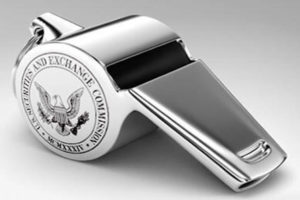
The Securities and Exchange Commission awarded a whistleblower “with compliance-related responsibilities” $450,000 for providing information that helped in a successful enforcement action.
While the SEC didn’t name the whistleblower, the company involved, or provide his or her title—in keeping with its confidentiality protections—it did say in a statement that it was only the third time the agency awarded funds to an individual who had compliance or internal audit responsibilities.
To be eligible under the SEC Whistleblower program, compliance and internal audit professionals must first report their concerns to the company and can only bring them to the SEC after 120 days of reporting their concerns internally.
Read related article, “What Internal Auditors Need to Know About SEC Whistleblower Law.”
“To ensure that important information about securities laws violations is reported to the SEC when appropriate corrective action is not taken by the company, the rules permit awards to compliance professionals in certain limited circumstances,” said Jane Norberg, Chief of the SEC’s Office of the Whistleblower. “Here, the whistleblower made reasonable efforts to work within the company’s compliance structure, suffered unique hardships as a result, and reported to the Commission after the requisite time period had passed, ultimately providing meaningful assistance to the Commission’s investigation and subsequent enforcement action.”
Special Circumstances
When the SEC finalized the Dodd-Frank whistleblower provisions in 2011, it listed compliance and internal audit professionals among those who are not eligible for whistleblower award under the program, along with corporate attorneys, public accountants, and officers and directors acting on information passed on to them by another employee.
In the ruling however, the SEC laid out a series of exceptions where internal audit and compliance professionals, as well as public accountants, could participate in the whistleblower program. Those circumstances include:
- The whistleblower believes disclosure may prevent substantial injury to the financial interest or property of the entity or investors.
- The whistleblower believes that the entity is engaging in conduct that will impede an investigation.
- At least 120 days have elapsed since the whistleblower reported the information to his or her supervisor or the entity’s audit committee, chief legal officer, or chief compliance officer—or at least 120 days have elapsed since the whistleblower received the information, if the whistleblower received it under circumstances indicating that such officials are already aware of the potential wrongdoing.
Nearly $400 Million Awarded
The SEC has now awarded over $396 million to 77 individuals since issuing its first award in 2012. All payments are made out of an investor protection fund established by Congress that is financed entirely through monetary sanctions paid to the SEC by securities law violators. No money has been taken or withheld from harmed investors to pay whistleblower awards. Whistleblowers may be eligible for an award when they voluntarily provide the SEC with original, timely, and credible information that leads to a successful enforcement action. Whistleblower awards can range from 10 percent to 30 percent of the money collected when the monetary sanctions exceed $1 million.
As set forth in the Dodd-Frank Act, the SEC protects the confidentiality of whistleblowers and does not disclose information that could reveal a whistleblower’s identity. ![]()
Joseph McCafferty is editor & publisher of Internal Audit 360°


